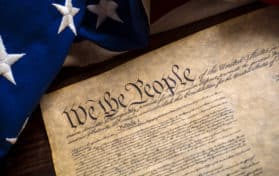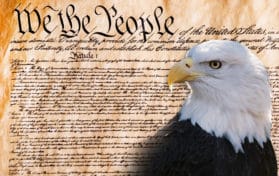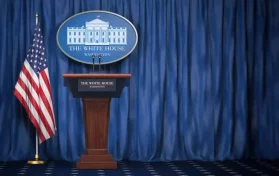
The Constitution establishes the framework of federalism, specifically enumerating the powers of the national government and reserving all other powers to the states.
Powers of the National Government
The powers granted to the national government by the Constitution are of two types: express powers and implied powers. Express powers are those explicitly and expressly mentioned in the Constitution. Implied powers are those which can reasonably be assumed to flow from express powers. For example, the Constitution expressly authorizes the Congress to “coin Money [and] regulate the Value thereof” (see Article I, Section 8). The formation of a national bank is an implied power, one which is “necessary and proper for carrying into Execution the foregoing Power.”
Express Powers
Most of the powers expressly granted to the national government are actually granted to the Congress in Article I, Section 8 of the Constitution. These include the power to:
- Lay and collect taxes
- Borrow money on the credit of the United States
- Regulate Commerce with foreign Nations, and among the States
- Establish Post Offices and post Roads
- Issue patents and copyrights
- Establish federal courts “inferior to the supreme Court”
- Declare War
- Raise and support Armies and provide and maintain a Navy
- Nationalize the state militias (National Guard) to execute the law, suppress rebellions or repel invasions
- Exercise “exclusive Legislation” over the District of Columbia and federally owned land
Additionally, the President of the United States is given almost exclusive authority to conduct foreign affairs. This authority includes the power to:
- Act as the Commander in Chief of the Army, Navy and National Guard (when called into service)
- Grant “Reprieves and Pardons” except in the case of impeachment
- Make treaties with other nations with the “Advice and Consent” of two thirds of the Senate
- Appoint Ambassadors, Supreme Court Justices and all other “Officers of the United States” (including cabinet members) with the support of a majority in the Senate
In practice, the President’s role as Commander in Chief has empowered the President to “make war” even when the Congress has not “declared” war. The relationship between the Congress and President in the conduct of war is discussed in “Presidential Power.”
Article III grants the Supreme Court jurisdiction over “all Cases, in Law and Equity, arising under this Constitution, the Laws of the United States, and Treaties made, or which shall be made, under their Authority.”
Removing all ambiguity about the extent of the national government’s authority, Article VI declares that “all Treaties made, or which shall be made, under the Authority of the United States, shall be the supreme Law of the Land; and the Judges in every State shall be bound thereby, any thing in the Constitution or Laws of any State to the Contrary notwithstanding.”
Implied Powers
In addition to the express powers of the national government and its officers detailed in the Constitution, the national government exercises a wide range of implied powers. The legitimacy of these powers flows from the “General Welfare” clause in the Preamble, the “Necessary & Proper Clause,” and the “Commerce Clause.”
On the basis of these “clauses,” the Congress and the President have, for example, established a national bank, built an interstate highway system, established an Air Force and the Marines (note that the Constitution only authorizes and Army and a Navy), created the Social Security system, and enacted hundreds of laws regulating the conduct of commerce, or business, conducted between the states and their residents.
Limits of National Government Power
While the powers granted to the national government and its officers by the Constitution are impressive, the Constitution also includes important restrictions on the extent of those powers. Most notably, the Bill of Rights includes several limitations on governmental action (see “Limits on the National Government”). In particular, the Tenth Amendment declares that:
The powers not delegated to the United States by the Constitution, nor prohibited by it to the States, are reserved to the States respectively, or to the people.
This Amendment has been cited by supporters of states’ rights perhaps more than any other provision of the Constitution.
In addition to the limitations included in the Bill of Rights, the Article I, Section 9 forbids the national government from:
- Suspending the Writ of Habeasp
- Taxing items exported from any state
- Giving preference to one state over another in the regulation of commerce
The Congress is also required to publish a “regular Statement and Account of the Receipts and Expenditures of all public Money”
Just as significantly, the national government is limited by the intricate system of checks and balances and auxiliary precautions built in to the Constitutional system. No laws can be passed without the concurrence of both houses of Congress and the consent of the President. (A bill rejected by the President can be passed if two-thirds of the members of both houses vote to pass it over the objections of the President. See “The Legislative Process.”) As noted, the War Powers are exercised jointly by the President and the Congress. Executive and judicial branch officers can be impeached and removed from office. Members of Congress must regularly face reelection and be held accountable by the people they represent. By these and other means, the Framers of the Constitution deliberately created a system of government in which it is much easier to prevent action than it is to facilitate it.
State Government Powers
As the Tenth Amendment clearly states, those powers not delegated to the national government are reserved to the states. However, the Constitution is almost silent on what these powers might be. The only significant state power specifically mentioned by the Constitution is the ability of the states to call for a constitutional convention and to ratify (or reject) proposed amendments to the Constitution.
Many constitutional scholars have assumed that those powers not mentioned at all in the Constitution were intended to be left to the states. The most significant policy area over which state and local governments have exercised almost complete control has been public education. While the national government has provided hundreds of billions of dollars to help pay for the provision of elementary, secondary and higher education, it has, for the most part, left the details of education policy to the states. Additionally, state and local governments are the exclusive providers (or regulators) of public utilities and services such as water, sewage systems, garbage removal and the maintenance of streets. Most of the other powers traditionally exercised by the states are not exclusively state powers, but rather powers that are shared by both national and state governments (see below).
Limits on State Power
The Constitution includes several prohibitions on state behavior. Most notably, states cannot:
- Make treaties with foreign governments
- Print or coin their own money
- Overrule civil judgments (such as divorce settlements) of courts in other states
- Treat nonresidents differently from residents (except for charging nonresidents more than residents for tuition to attend state colleges and universities)
- Refuse extradition requests from other states (if someone is charged with a crime in another state, a state must surrender the suspect to the state where the crime was committed)
- Wage war against other states or nations
Shared Powers
While there are many powers that the Constitution clearly gives to the national government and not to the states, the vast majority of the powers “reserved” to the states are, in fact, exercised jointly by the national and state governments, although at different levels and with different areas of jurisdiction. Appropriately, these powers are referred to as “shared” or “concurrent” powers.
Examples shared powers abound. Anyone who earns a paycheck knows that income is taxed by the national government, by most state governments and even by some municipal governments. Governments at every level collect taxes to fund their activities. Additionally, national, state and local governments maintain law enforcement agencies that often work together to prevent and punish the same crimes. Moreover, virtually every level of government makes, implements and interprets the laws that apply to its sphere of influence. It is with regard to these and other shared powers that the marble cake metaphor is most appropriate.





